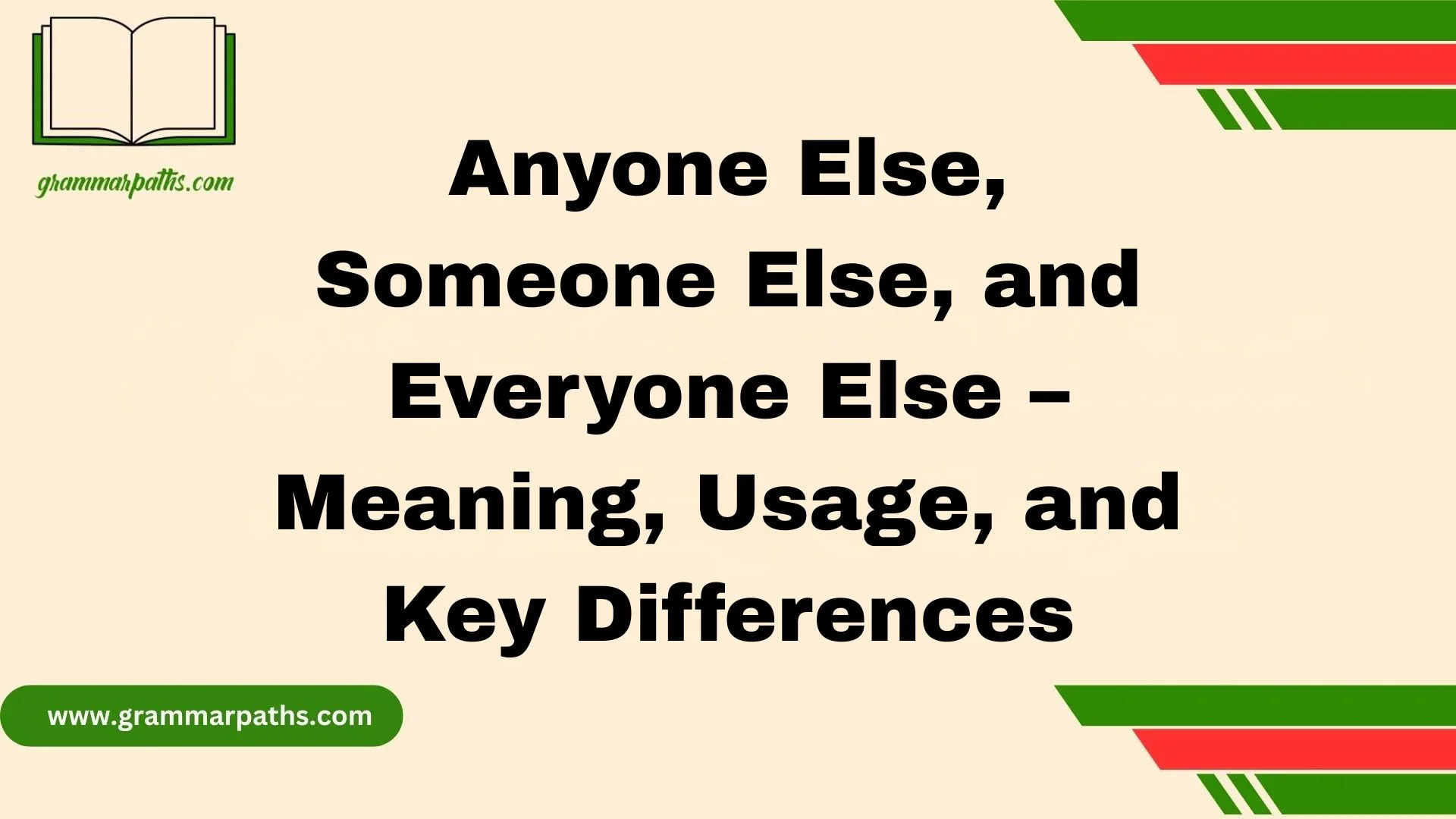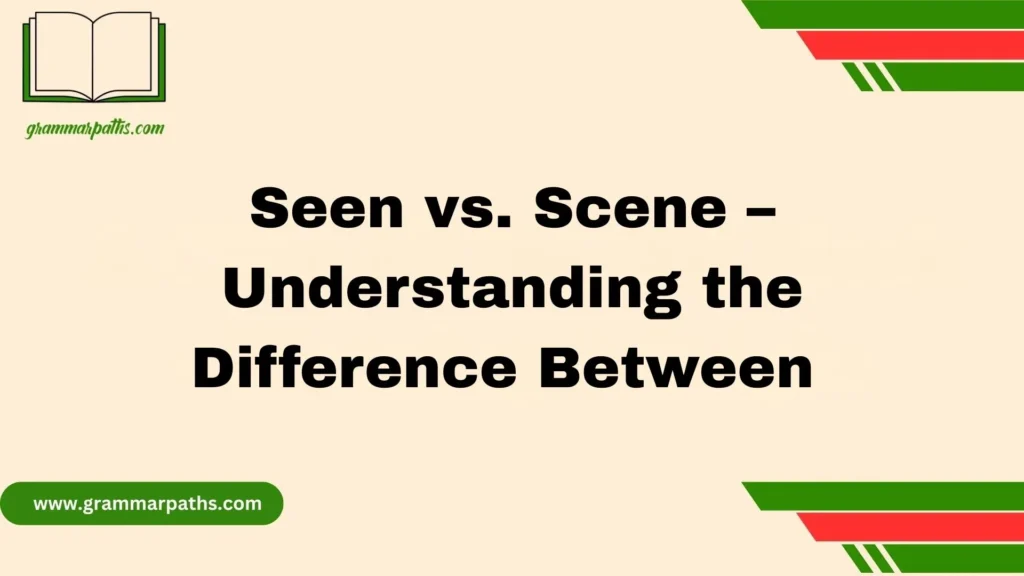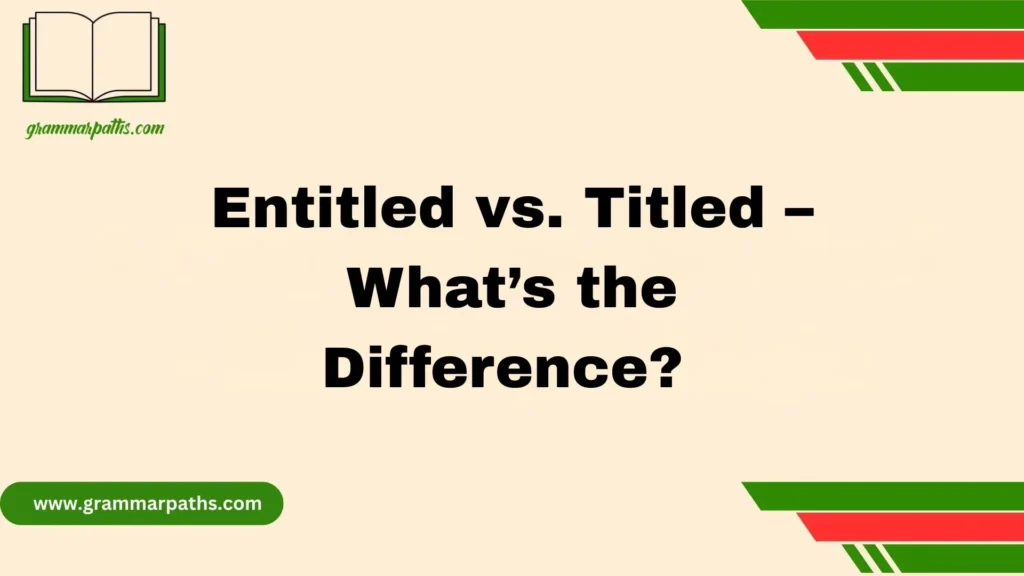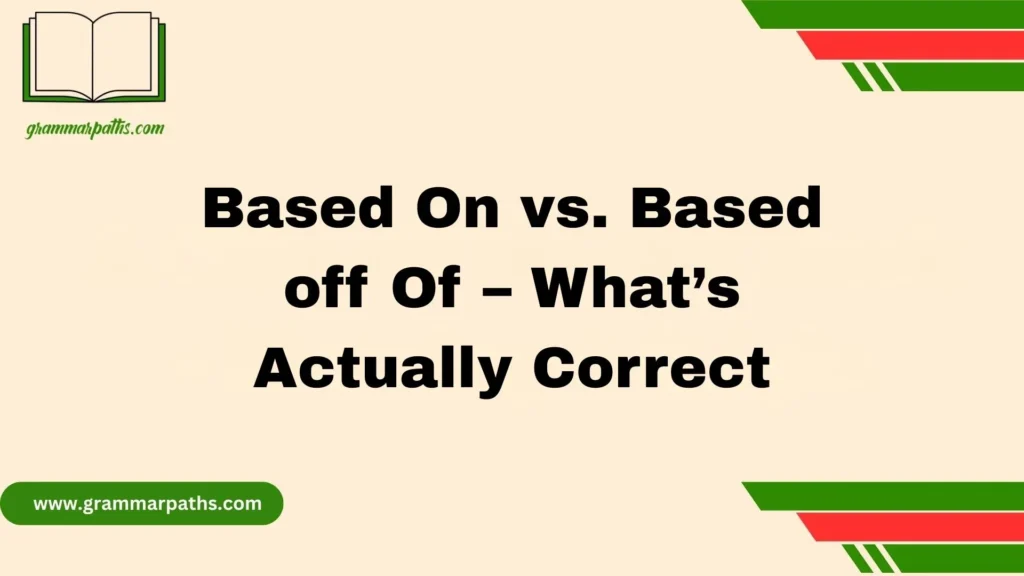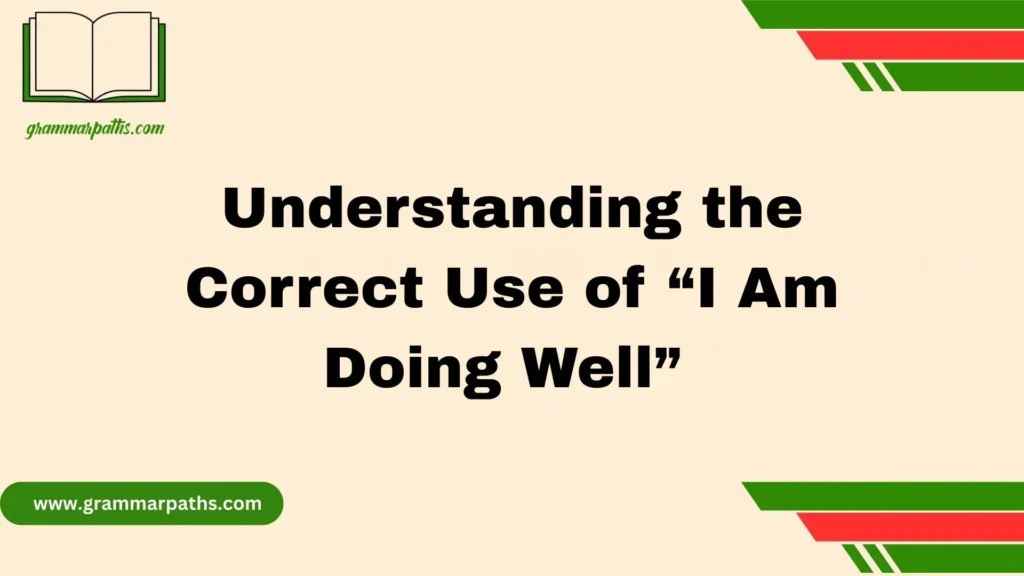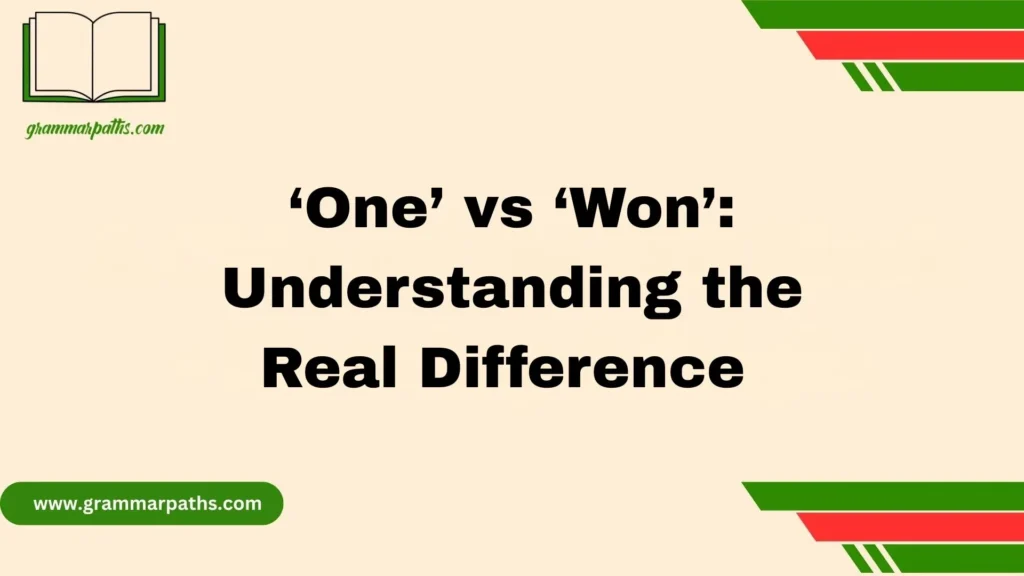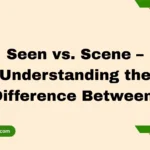In English, a small word like else can carry more weight than it looks. When we attach it to pronouns such as anyone, someone, or everyone, the entire sentence shifts in meaning, intent, and even tone. These aren’t just fancy expressions or casual phrases—they’re precise tools that shape social interactions. From my own journey as a teacher and writer, I’ve seen how a single phrase like someone else can change the scope of a conversation. In writing or emails, I’ve noticed that misusing it may turn a polite suggestion into a subtle rejection. That’s why being aware of grammar rules and the emotional impact matters so much. These patterns affect not just how we speak but also how we build clarity in communication.
In both spoken and written forms, using these alternatives correctly shows fluency and keeps the flow natural. Language is more than rules—it’s about rhythm and balance, and good writers know this well.. Choosing the right phrasing adds skill and maintains an authentic voice, making sure your audience connects without confusion. In practice, this means using alternatives thoughtfully to avoid awkward wording while strengthening both personal and professional communication.
The Role of “Else” in English Grammar
What does else mean?
The word else adds the idea of “in addition to” or “different from.” It works as a modifier, usually attached to indefinite pronouns like anyone, someone, everyone, nobody, or even anything.
- Do you want anything else? (something additional)
- I don’t trust anyone else with this secret. (someone different)
How does else function?
- It limits or expands the group you’re referring to.
- It’s always singular in form, even though it might refer to more than one person.
- It often appears in questions, exclusions, and contrasts.
Singular vs. plural considerations
Grammatically, words like anyone, someone, and everyone are treated as singular, even if they refer to multiple people. That’s why we say:
- Everyone else is coming.
- Not: Everyone else are coming.
This singular agreement confuses learners, but it follows standard English grammar rules.
Breaking Down Anyone Else
Core meaning
Anyone else refers to any other person apart from the one already mentioned or implied.
- Does anyone else know the answer?
- I don’t need help from anyone else.
Examples in statements
- I can’t think of anyone else who would enjoy this movie.
- He’s more reliable than anyone else on the team.
Here, anyone else emphasizes comparison or exclusion.
Examples in questions
- Would anyone else like to volunteer?
- Did anyone else notice the mistake?
Questions with anyone else invite participation beyond the expected person.
Anyone else vs. Anybody else
Both are correct and nearly interchangeable. However:
- Anybody else feels slightly more casual, common in spoken English.
- Anyone else is often preferred in writing or formal contexts.
| Expression | Tone | Example |
| Anyone else | Formal/neutral | Has anyone else submitted their report? |
| Anybody else | Informal/casual | Anybody else hungry? |
Exploring Someone Else
Meaning
Someone else points to another unspecified person, not just anyone in general. It narrows down the choice.
- She asked someone else to drive her home.
- If I can’t do it, someone else will.
Common real-life contexts
- Work delegation: The manager gave the task to someone else.
- Relationships: He left because of someone else.
- Problem-solving: If you can’t fix it, we’ll find someone else who can.
Examples in speech and writing
- Could you send someone else instead?
- She thought someone else had already completed the project.
Someone else vs. Somebody else
Again, both are grammatically correct.
- Somebody else sounds conversational.
- Someone else fits better in professional or academic writing.
Understanding Everyone Else
Meaning
Everyone else means all other people apart from the speaker or subject.
- Everyone else agreed with the plan.
- She finished earlier than everyone else in the class.
Inclusivity and exclusivity
- Inclusive use: Referring to a whole group except one.
Everyone else was invited except me. - Exclusive use: Highlighting contrast.
Everyone else liked the movie, but I didn’t.
Examples in real contexts
- Workplace: Everyone else attended the meeting online.
- Academics: He outperformed everyone else on the exam.
- Social settings: Everyone else left before midnight.
Everyone else vs. Everybody else
- Everyone else → slightly formal, often written English.
- Everybody else → casual, everyday conversations.
| Expression | Formality | Common Usage |
| Everyone else | More formal | Academic, business, professional |
| Everybody else | Casual | Friends, casual speech |
Comparing Anyone Else, Someone Else, and Everyone Else
Key distinctions
| Phrase | Scope | Example |
| Anyone else | Any other person, non-specific, open choice | Is anyone else joining us? |
| Someone else | A particular but unknown other person | She wants someone else to do it. |
| Everyone else | All other people apart from the subject | Everyone else finished earlier. |
Common mistakes learners make
- Using plural verbs with everyone else:
- Wrong: Everyone else are here.
- Correct: Everyone else is here.
- Mixing up someone else with anyone else:
- Wrong: Someone else can join if they want. (unclear)
- Better: Anyone else can join if they want.
- Forgetting possessive forms:
- This is someone else’s book. (correct)
- Not: This is someone else book. (incorrect)
Common Questions and Misconceptions
Is there a difference between anyone else and anybody else?
Not in meaning. The difference is in tone—anybody else is casual, while anyone else feels neutral or formal.
Can else ever be plural?
No. Even if it refers to multiple people, grammar treats it as singular.
Which is correct: “Everyone else is” or “Everyone else are”?
The correct form is everyone else is.
Example: Everyone else is waiting outside.
Do these phrases work in professional writing?
Yes, but use the formal versions (anyone else, someone else, everyone else) in emails, reports, and essays. Reserve anybody and everybody for casual contexts.
Practical Tips for Mastering Usage
- Check the scope: Are you talking about any person, a specific person, or all other people? Choose anyone, someone, everyone accordingly.
- Mind the verb agreement: Treat these pronouns as singular.
- Remember formality: Use anyone, someone, everyone in writing; use anybody, somebody, everybody in speech.
- Practice with sentence starters:
- Does anyone else…
- Could someone else…
- Everyone else is…
Quick memory trick
Think of it as a ladder of scope:
- Anyone else = wide open, no restriction.
- Someone else = one alternative person.
- Everyone else = all other people.
Conclusion
Using anyone else, someone else, and everyone else may look simple, but these small expressions carry big weight in English. They change the meaning, tone, and intent of a sentence, and the way they’re applied in spoken or written forms can affect communication, clarity, and even the emotional impact of your message. Whether in casual social interactions or professional writing and emails, choosing the right phrase helps maintain balance, show fluency, and keep your voice authentic. As my own journey with language and grammar rules has shown, these little words act as powerful tools—ones that can turn a suggestion into encouragement or, if misusing, an unintended rejection.
FAQs
What’s the difference between “anyone else,” “someone else,” and “everyone else”?
- Anyone else is open-ended, referring to no specific person.
- Someone else points to one other, but not named, individual.
- Everyone else means all others in the group except the one mentioned.
Why does adding “else” matter in English?
Because this small word changes the scope, intent, and even the tone of a sentence, making it more precise in daily language.
Can misusing these expressions cause problems?
Yes. For example, in emails or writing, saying “get someone else to do it” may sound like a rejection, even if it was meant as a polite suggestion.
What’s the best way to master them?
Practice in spoken and written contexts, pay attention to grammar rules, and notice how different expressions change the flow and emotional impact in conversations.

Emma Brooke is a passionate language expert and contributor at GrammarPaths.com, where she helps learners navigate the complexities of English grammar, idioms, and effective writing. With a strong academic background and years of teaching experience, Emma excels at turning tricky grammar rules into simple, practical lessons that readers can easily grasp.
